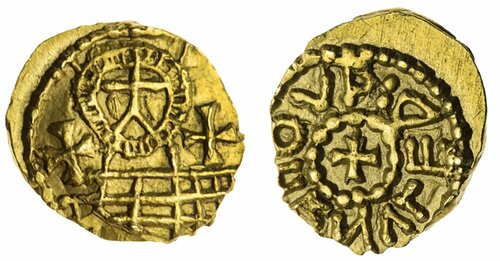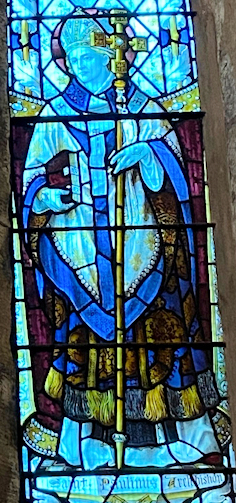|
 An Anglo-Saxon coin found at Pocklington has recently been linked to Paulinus converting locals to Christianity in 627 AD. An Anglo-Saxon coin found at Pocklington has recently been linked to Paulinus converting locals to Christianity in 627 AD.
The 1,400-year old mid-Saxon gold coin, discovered by a metal detectorist at Pocklington in 2007, was recognised almost a decade later as a ‘Paulinus Gold Shilling’, attributed to the episcopy of the first Bishop of York, 627-633. And the tiny coin was further conjectured to be a commemorative token given by Paulinus after carrying out the first baptisms in Pocklington beck.
Paulinus converted Edwin, King of Northumbria, to Christianity after dramatic events at Goodmanham at Easter 627, described a century later by the Venerable Bede in his Ecclesiastical History of the English People.
 The royal household returned to Edwin’s capital at York where he appointed Paulinus its first bishop and commenced building the original York Minster. Paulinus then set about taking Christianity across the north, holding mass baptism gatherings at key places throughout the kingdom, with one of them believed to be in Pocklington. The royal household returned to Edwin’s capital at York where he appointed Paulinus its first bishop and commenced building the original York Minster. Paulinus then set about taking Christianity across the north, holding mass baptism gatherings at key places throughout the kingdom, with one of them believed to be in Pocklington.
For a decade the coin was loaned to internationally renowned numismatic repository, Cambridge’s Fitzwilliam Museum; but in 2020 the museum decided to return it to its owner, Tony Abramson, who just happens to also be the leading expert on early Saxon coinage.
During his further research and evaluation in 2016 the inscription was newly translated as PAVLINVS EP[ISCOPVS], identifying it for the first time as an early Saxon gold shilling attributed to Paulinus. Furthermore it is now thought the coin’s purpose was commemorative, rather than monetary, Abramson stating: "The distribution pattern of the Paulinus shillings may mark his mass-baptismal activity, a gold shilling being an appropriate donative from Paulinus to support the local church".
The coin’s discovery and identification augments Pocklington’s longstanding Paulinus legend. The Sotheby Cross was found in the churchyard in the 1830s where it had been buried for centuries (such crosses were ordered to be destroyed in the Tudor Reformation), with a cross base inscribed ‘Paulinus hic praedicavit et celebravit AD 627’. And it is claimed that the Sotheby Cross was a Medieval replacement for an earlier Saxon preaching cross marking Paulinus visiting the town and establishing its first church.
One face of the cross head has a depiction of Paulinus as bishop of York, and in the church’s north transept there is also a Paulinus window, pictured here, given by the Powell family in the C19th.
Pocklington’s mid-Saxon context has been further strengthened in recent years by the archaeological discovery of a rare Anglo-Saxon settlement site dated to the mid-7 th century; plus Ground Penetrating Radar investigations inside All Saints indicating anomalies under the Norman church building that have been interpreted as earlier Saxon foundations.
The coin news was welcomed by the Vicar of Pocklington, Jake Belder, who said: "While churches across England are always keen to celebrate their history, the details of that history can often be unclear. The discovery of the Paulinus coin helps us to make a bit more sense of the earliest period of All Saints Church, and to remember that, from the beginning, a commitment to share the good news of God's love in Jesus Christ has been at the very heart of our church's life and mission"
The coin’s identification is timely, as it comes in advance of All Saints celebrating in 2027 the 1,400 th anniversary of its foundation by Paulinus, who was canonised after his death in Kent in 644.
|

